October 24, 2016
Inside California’s Plastic Bag War
How competing forces are shaping the debate over a statewide plastic bag ban – and what the Election Day referendum will mean to the rest of the country.
In the ongoing war against single-use plastic bags, California has served as the key battleground. Since 2007, when the very first measures were enacted by the City of San Francisco, nearly 150 cities and counties statewide have banned groceries and drug stores from giving single-use plastic bags to customers. Customers have the choice of paying at least 10 cents for recycled paper bags or bringing their own reusable tote bags from home – a result that has been a boon for the promotional products industry.
“Business has gone up in the past few years,” says Ryan Kaback, a partner at San Diego-based Custom Logos (asi/173183). “We’ve sold more tote bags than ever before.”
Now, the fight is set to reach its epic climax with an election-day showdown. On Tuesday, November 8, Californians will vote on Proposition 67 – a last-ditch effort by plastic bag manufacturers to overturn the statewide plastic bag ban enacted by Senate Bill 270 in 2014. If a majority of California voters mark “yes” on Prop. 67, the statewide ban signed by Governor Jerry Brown will be upheld. If a majority votes “no,” the statewide ban will be rejected. While existing city and county laws barring plastic bags will remain in place under that scenario, it will surely cool off efforts in other parts of the nation to ban plastic bags. The future of plastic bags – and much of the promotional product industry’s good fortune – is at stake.
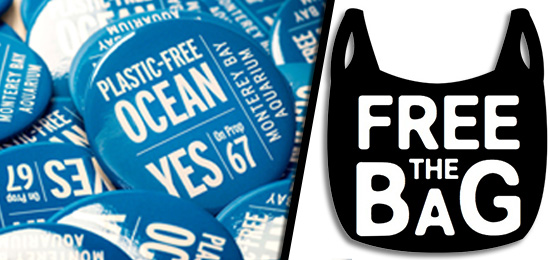
 he American Progressive Bag Alliance (APBA), a lobbyist organization dedicated to fighting plastic bag bans, sparked the Prop. 67 referendum by exercising a provision in the state constitution that allows for a popular vote on a law before it takes effect. The APBA spent almost $3 million to collect the 504,760 valid signatures required to put this measure before voters, according to state election data.
he American Progressive Bag Alliance (APBA), a lobbyist organization dedicated to fighting plastic bag bans, sparked the Prop. 67 referendum by exercising a provision in the state constitution that allows for a popular vote on a law before it takes effect. The APBA spent almost $3 million to collect the 504,760 valid signatures required to put this measure before voters, according to state election data.
Opposite the APBA is Yes on 67, a coalition of environmental groups, grocers, elected officials and consumer organizations who support the ban. Close to 14 billion plastic bags enter the California environment every year, the coalition says, and less than 2% of the bags are recycled. Municipal recyclers, many of whom are aligned with Yes on 67, claim the bags clog their machines and ruin their equipment. Additionally, the coalition argues that plastic bags clutter landscapes, pollute oceans and pose a deadly threat to wildlife. “Proposition 67 changes the question from paper or plastic to do you need a bag,” says Andy Keller, founder and CEO of California-based ChicoBag Company (asi/44811) and a vocal advocate for plastic bag reductions. “It helps people change habits and automatically reduces consumption.”
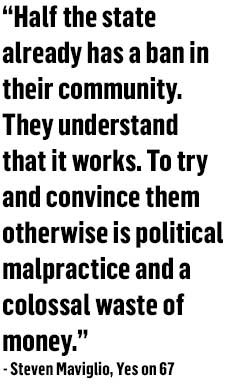 Cities and counties that banned plastic bags have reported significant reductions in litter and waste. In the first year of the ban taking effect, San Jose found that creek and river litter decreased by 76%, litter in storm drains reduced by 69%, and park and roadside litter dropped by 59%, according to the city’s transportation and environment committee.
Cities and counties that banned plastic bags have reported significant reductions in litter and waste. In the first year of the ban taking effect, San Jose found that creek and river litter decreased by 76%, litter in storm drains reduced by 69%, and park and roadside litter dropped by 59%, according to the city’s transportation and environment committee.
“Half the state already has a ban in their community,” says Steven Maviglio, spokesman for Yes on 67. “They understand that it works. To try and convince them otherwise is political malpractice and a colossal waste of money.”
Saving money is one of the coalition’s platforms; the National Resources Defense Council reported that more than $400 million in local government spending has been used for cleaning up litter and preventing it from reaching waterways. San Jose estimated an annual loss of $1 million due to plastic bag-related repairs in its facilities. San Francisco and Sacramento reported similar expensive shutdowns. The conclusion, according to Maviglio and Yes on 67: eradicating plastic bag use will be much more cost-effective.
In an effort to raise awareness, Maviglio says that Yes on 67 has launched an aggressive social media campaign, gained the editorial support of every major newspaper in California, and has held about 30 press conferences around the state where an inflatable “Plastic Bag Monster” strikes fear into the hearts of undecided voters. As of September, Yes on 67 has raised $2.4 million in contributions, all from California donors, for the campaign, according to state election data.
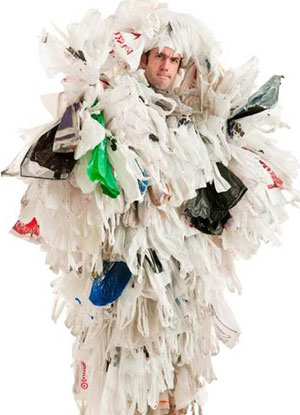
Andy Keller of ChicoBag Company (asi/44811) dresses up as “The Bag Monster” to advocate against the use of plastic bags. His suit is made of 500 plastic bags.
Meanwhile, the APBA has almost tripled that amount, raising $6.1 million to oppose Prop. 67. The majority of that funding comes from bag manufacturers: Hilex Poly Co. LLC in South Carolina, Formosa Plastics Corporation U.S.A. in New Jersey, and Superbag Corp. and Advance Polybag, Inc. in Texas (all of whom manufacture their bags in the U.S.).
The APBA strives to educate policy makers and the public on the importance of plastic bags and to challenge Yes on 67’s environmental stance. “This has become a political conversation rather than a legitimate policy conversation,” says Jon Berrier, spokesperson for the APBA. “Special-interest groups teamed up with environmental activists and the California Grocers Association to elevate their profiles and ultimately gain more fundraising.”
The APBA says that plastic is an inexpensive, versatile material that is convenient for shoppers (90% of whom reuse the bags), and that manufacturing the material provides thousands of jobs across the country. In response to environmental concerns, the APBA points to data from the U.S. Environmental Protection Agency that plastic bags, by weight, accounted for just .3% of the U.S. municipal solid waste stream in 2009. Additionally, plastic retail bags comprise less than 2% of litter, according to litter survey firm Environmental Resources Planning, LLC. The APBA also points out that plastic bags generate 80% less waste and use 96% less water than paper bags.
“This ban will not have any meaningful impact on the environment,” Berrier says. “The science has been hijacked. You have special interest groups and very ideologically bent activists exaggerating or making up information targeting this product.”
The APBA suggests that the ban isn’t to benefit the environment, but rather to line the pockets of grocers who will be collecting an estimated $300 million per year in revenue from consumers forced to pay a minimum of 10 cents for every paper bag given at the checkout.
In order to address the financial issue, the APBA has pushed for another initiative on California’s ballot: Proposition 65, which would allocate revenue generated from the sale of the paper bags to the new Environmental Protection and Enhancement Fund managed by the state's Wildlife Conservation Fund. The fund could be expanded to support recycling, litter removal, wildlife habitat restoration, drought mitigation, clean drinking water supplies, beach cleanup and state, regional and local parks.
“By highlighting Proposition 65, we’re educating voters on the fees and highlighting some of the biggest deficiencies and misguided elements of Prop. 67,” Berrier says. “Even though there are folks who may believe that they should uphold the ban, based on their ideology in California with the heavily Democratic electorate and a general sensitivity to environmental issues, those same folks do not want money collected under the ban to go to the retailers.”
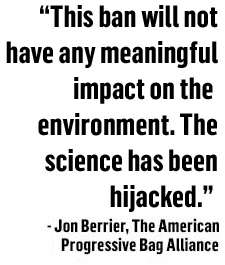
Even if Prop. 67 is defeated, the passing of Prop. 65 would still apply to the counties and cities in the state that have enacted bans. If both Prop. 65 and 67 pass, the allocation of the paper bag tax will be determined by the number of “yes” votes. If 65 receives more “yes” votes than 67, the money would be funneled to the environmental fund.
If, that is, the statewide ban ever gets off the ground. Maviglio argues that Prop. 65 is simply gamesmanship by the plastic bag industry. The spokesperson says the language is so vague that it will be subject to legal challenges and tied up in court for years, essentially stalling the statewide ban from implementation. “Prop. 65 is disingenuous,” Maviglio says. “The amount of revenue that will be raised and distributed is very much in question. I’m on the board of directors of an independent grocer in Sacramento and I can tell you that the bags cost us 16 cents. So when we sell them for 10 cents, we’re still losing money.”
In a 2015 poll of likely California voters conducted by consulting firm GS Strategy, nearly 82% of respondents supported directing the paper bag fee to environmental programs or drought mitigation, or rolling it into the state budget. (It was on May 20 this year that the APBA got the requisite number of signatures and submitted a petition to put Prop. 65 on the ballot.)
No such polling exists for Prop. 67, but the general sentiment is that the referendum will be approved. Harry Ein, owner of Perfection Promo, an iPromoteU (asi/232119) affiliate based in San Francisco, says that the vote on Prop. 67 is just a formality. “Consumers are already used to it,” Ein says. “The environmental education has come through and people have adjusted.”
 f Prop. 67 passes, California will technically become the first state to enact a statewide ban. (Hawaii has essentially prohibited plastic bags as a result of all of its most populous counties passing bans.) It will certainly be the most substantial victory for advocates of plastic bag bans, the latest in a series of measures passed throughout the U.S. Major cities such as Chicago, Seattle and Portland, OR, have also passed bans. Additionally, more than 100 counties and municipalities across the country have enacted ordinances either banning plastic bags or imposing a fee for using them.
f Prop. 67 passes, California will technically become the first state to enact a statewide ban. (Hawaii has essentially prohibited plastic bags as a result of all of its most populous counties passing bans.) It will certainly be the most substantial victory for advocates of plastic bag bans, the latest in a series of measures passed throughout the U.S. Major cities such as Chicago, Seattle and Portland, OR, have also passed bans. Additionally, more than 100 counties and municipalities across the country have enacted ordinances either banning plastic bags or imposing a fee for using them.
International governments have been targeting plastic bags as well. In 2014, the European Parliament passed a directive to limit plastic bag use by 50% by 2017 and 80% by 2019, leaving the 28 member states to either ban bags or tax them. The Republic of Ireland has taxed plastic bag use since 2002, and even allocates the money to an environmental fund similar to the proposal of Prop 65.
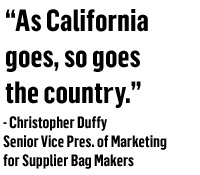 Christopher Duffy, senior vice president of marketing for supplier Bag Makers (asi/37940), has been following the plastic bag issue as it travels from state to state. He says the bans and fees have been of great benefit to the promotional products industry, which can leverage them to offer reusable bag marketing solutions to their clients. For example, when Los Angeles (the largest city in California and second largest in the U.S.), banned single-use plastic bags in 2014, Duffy says his company saw an immediate increase in sales as savvy distributors reached out for nonwoven tote bags. “They’ve created a demand based on what the government is doing,” Duffy says. “People feel like they’re contributing to smaller landfills, less litter and better waterways by using reusable, nonwoven bags.”
Christopher Duffy, senior vice president of marketing for supplier Bag Makers (asi/37940), has been following the plastic bag issue as it travels from state to state. He says the bans and fees have been of great benefit to the promotional products industry, which can leverage them to offer reusable bag marketing solutions to their clients. For example, when Los Angeles (the largest city in California and second largest in the U.S.), banned single-use plastic bags in 2014, Duffy says his company saw an immediate increase in sales as savvy distributors reached out for nonwoven tote bags. “They’ve created a demand based on what the government is doing,” Duffy says. “People feel like they’re contributing to smaller landfills, less litter and better waterways by using reusable, nonwoven bags.”
If Prop. 67 passes, Ein doesn’t expect a huge bump in nonwoven bag sales; not only has half of California already approved bans, but consumers in the state have gotten the message and become acclimated to using reusable bags.
Looking broader, will California’s statewide ban influence others? Duffy says it’s highly unlikely that plastic bag bans will go nationwide, but Prop. 67 will certainly influence other states or lawmakers looking at this issue. “As California goes,” Duffy says, “so goes the country.”
Legal Truths
 Andy Keller, founder and CEO of California-based ChicoBag Company (asi/44811), has tusseled with the plastic bag industry in the past. In 2011, Hilex Poly Co., Superbag Corp. and Advance Polybag (the major plastic bag manufacturers in the U.S.) sued ChicoBag for posting what they claimed was false and misleading information about plastic bags on the company’s website. The lawsuit was filed in South Carolina, one of 22 states that allows SLAPP (Strategic Lawsuit Against Public Participation) suits, which are intended to censor and intimidate critics by burdening them with the cost of a legal defense. (California’s anti-SLAPP law is considered to have the broadest protection.)
Andy Keller, founder and CEO of California-based ChicoBag Company (asi/44811), has tusseled with the plastic bag industry in the past. In 2011, Hilex Poly Co., Superbag Corp. and Advance Polybag (the major plastic bag manufacturers in the U.S.) sued ChicoBag for posting what they claimed was false and misleading information about plastic bags on the company’s website. The lawsuit was filed in South Carolina, one of 22 states that allows SLAPP (Strategic Lawsuit Against Public Participation) suits, which are intended to censor and intimidate critics by burdening them with the cost of a legal defense. (California’s anti-SLAPP law is considered to have the broadest protection.)
Superbag Corp. and Advance Polybag dropped out of the lawsuit after it was filed; Keller (who runs the blog Bagmonster.com and wears a suit made out of 500 plastic bags to raise awareness) says they withdrew their accusations after the listed facts were verified by some of the leading scientists and experts in the country. Hilex Poly Co. and ChicoBag agreed to a settlement in 2011 in which both companies would use the most recent EPA data regarding plastic bags, and show sources and dates for the data. Hilex Poly Co. also agreed to print a message on its bags informing users to tie the bag in a knot after use to prevent windblown litter. ChicoBag’s insurance company was to pay an undisclosed financial amount.